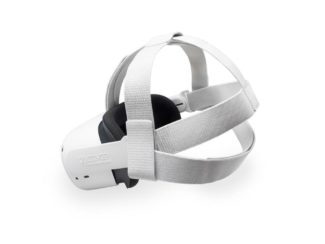VRCover offers a variety of accessories for VR headsets, including Oculus Quest 2. But how does VRCover’s stretchy Headstrap Replacement stack up against the strap included with the Quest 2? Here are our impressions.
Oculus Quest 2 comes with a stretchy, adjustable fabric strap that can be adjusted at the back and the sides — a change from the hard rubber strap included with the original Quest. While the Quest 2’s fabric strap generally does the job, it can be a tad finicky to adjust while on your head and often starts to make the headset feel heavy on the forehead after around 10-15 minutes. Oculus’ official alternatives — the Elite Strap and Elite Strap with battery pack — do a better job, but have had quality control issues with cracks on the sides.
So if you’re looking for something similar to the included strap but with a bit more support, does VRCover’s Headstrap Replacement do the trick?

On the whole, yes. At its core, the VRCover Replacement Strap is in the same vein as the Quest 2’s included strap, with a few key differences and improvements. It’s closer to the included Quest 2 strap than the Elite and is made out of very similar, soft and stretchy fabric material. Just like any other replacement strap, installation is easy — the top strap slips into the holder under the facial interface, and the sides click onto the Quest headset with ease.
While it may be in the same vein as the included strap, VRCover’s alternative differs by offering something slightly more complicated, with more straps in total, a slightly trickier fitting session but with increased comfort overall.
The biggest difference is that instead of one horizontal strap running across the back of your head, the VRCover strap has two horizontal straps. There’s one that sits the bottom of you head (in a similar position to bottom of the original Quest’s strap) and one that sits slightly higher on the back of your head.
Even better, both of these horizontal straps are made from the same single piece of fabric, folded over – this means you only need to make one adjustment to affect the tightness of both straps. They tighten in tandem, which is clever and convenient.
Speaking of – unlike the included Quest 2 strap, which has the adjustable knobs akin to tightening a bike helmet — the VRCover strap uses velcro. The benefit is that it’s much easier to quickly adjust mid-session, but the downside is that it’s harder to quickly get the strap super tight, due to the elastic nature of the fabric.

In addition to the back horizontal straps, there is the overhead strap that runs from front to back, just like any other strap. However, there’s also an overhead strap that runs in the opposite direction, across the top of your head horizontally from left to right, connected in the middle to the other overhead strap. This horizontal strap lets you tighten across the top of your head, which I found help with overall stability.
It’s hard to judge how effective any VR headstrap will be at providing the right level of adjustment and comfort for everyone. No two human heads are the same, and so people will often have different strap preferences. That being said, for me the VRCover Replacement Strap offered an improved alternative over the strap included in the Quest 2 box in small but important ways. It’s more complicated, but for good reason — once the fit is right, I found the VRCover strap to relieve some tension on the forehead while also feeling more stable during intense play sessions.
There’s more moving parts in the VRCover strap, which makes it a bit harder to just throw on your head quickly. However, the pay-off is clear — there’s more areas to tighten and adjust, which should give you a better, more supportive fit.
The VRCover Replacement Strap for Quest 2 is available to order online now for $24.
What’s your favorite Quest 2 strap? Let us know in the comments.





